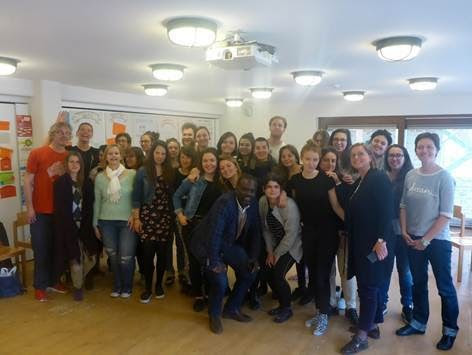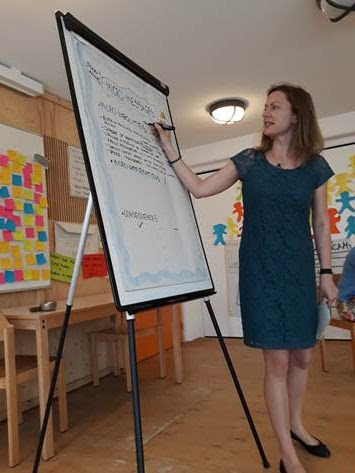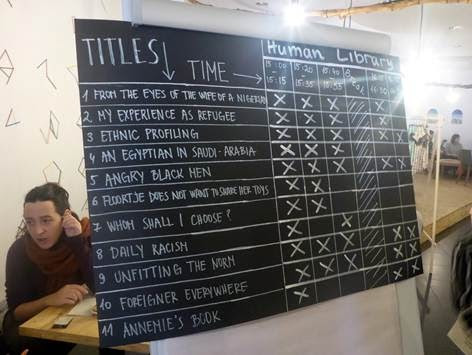From Small Steps to Big Changes
1 January 2018 - 31 August 2018
The idea
The “From Small Steps to Big Changes” project aimed to increase the capacity of 10 partner organisations in becoming actors of change in their local environment. We wanted to enable our partners to work more effectively and actively for a more inclusive and prejudice-free Europe.
With this initiative, SCI tackled the growing discriminatory attitudes in the EU in 2018, and worked against the rise of xenophobia and fears against refugees, migrants and generally ‘others’.
We contributed with our expertise on anti-discrimination projects and shared them with almost 30 youth workers and activists from Europe, who later on organised country actions in order to reach the multiplier’s effect.
The project initiators and coordinators were Natalie Jivkova and Gośka Tur, SCI trainers and activists.
The activities
“From Small Steps to Big Changes” was an 8-month long project that consisted of 2 main elements: a training course and local actions.
Training course “From Small Steps to Big Changes: Tackling discrimination in everyday life”
Antwerp (Belgium), 12 – 18 April 2018
The training course was attended by 30 participants from Belgium, Bulgaria, Germany, Greece, Hungary, Poland, Slovenia, Spain and Sweden. The event included elements of:
- theory (what is discrimination, how to react to it),
- a direct encounter with minorities (Human Library event in Antwerp),
- practice (practising intervention in situations of discrimination both as an individual and an organisation),
- and action planning (small-scale activities that project partners can do in order to prevent the growth of xenophobia and discrimination).
Local actions
The local country actions were implemented by the participants after the training course.
The participants organised educational activities in local communities and societies on the topics of stereotypes, prejudice, and discrimination – both Human Libraries and other events that aimed at diminishing the fear of others, and, as a result, the discrimination levels in the communities.
With the country actions, SCI reached the desired multiplier effect.
Results
The project was ranked extremely well among the participant: on the overall satisfaction scale 1-10 (10 being the highest satisfaction level), the participants chose answers between 8 and… 11!
During the training, the participants grew their knowledge about stereotypes, prejudice and discrimination as well as about the methodology of Human Library and how to organise it. After understanding better the current situation in the partner countries and Europe, the group also learned practical ways of tackling discrimination on a personal and organisational level in everyday life. The training also helped the personal growth and development of the participants.
Here some of their feedback:
I gained self-esteem and developed a skill of listening to other opinions about sensitive topics. Also, I learned a lot about Human library and it made me more conscious about stereotyping.
More understanding of the people’s differences according to our background. I learned valuable information about what human library is and how to organize it. I also gained some useful knowledge about how to react in certain situations.
Learning about inclusion and anti-discrimination in the city of Antwerp that is so multicultural was a wonderful idea.
This TC couldn’t have happened at a better time in my life and I’m incredibly grateful that I could take part in this experience, because not only I learned a ton of material and upgraded my knowledge on subjects that I find important and interesting, I also found out a lot of things about myself too.
The project aimed to get a sound understanding on the increase of knowledge by using ex-ante and ex-post tests which participants filled in at the beginning and at the end of the training (anonymously, being given only secret numbers to compare the growth of knowledge). The tests all had the same 10 questions referring to the different topics covered by the training course. Only one question was closed, all others were open.
The tests documented an incredible increase in knowledge on anti-discrimination. The most striking difference is the average percentage of points received:
- from merely 30.6% at the start of the training
- to 81% score at its end.
This means an increase of knowledge by 265%!
The impact
Through the project, SCI contributed to a greater understanding and acceptance of ‘others’ among young people and contributed to a healthy, fact-based discourse on minorities, migration, refugees, and inclusion in the EU.
The impact on the 30 project participants:
- increased knowledge on stereotypes, prejudice, and discrimination,
- new skills on how to tackle discrimination,
- increased competence in organising anti-discriminatory events,
- developed expertise on how to organise Human Library events,
- increased motivation to lead activities for the benefit of marginalised and discriminated groups and individuals.
The impact on the 10 participating organisations:
- 5 additional youth workers within each organisation, with whom the training results were shared in a form of peer learning and/or mentoring, and sharing training materials – altogether 50 persons,
- increased quality of workshops, training courses, seminars, intercultural meetings and other educational situations, through the raised quality of youth workers’ expertise and skills,
- more networking opportunities among the participating organisations, basis for the future projects on similar topics,
- new activists and volunteers to support the organisations: a resource for future initiatives for the benefit of the local community.
Wider impact
The “From Steps to Big Changes” project had also positive impact on the local communities in 9 project countries, on all participants of the workshops, Human Library events, and audience of other non-formal and informal actions, organised by the SCI’s multipliers.
By the end of the project (August 2018), we counted around 360 participants in Human Library events (60 books + 350 readers) in various countries. This number doubled by the end of 2018 and kept on increasing in the following years.
Until now, the project participants act against discrimination in their communities.
We believe that with the implementation of the project at European level we managed to contribute to a better informed and more inclusive European community: society members which do not base on stereotypes and prejudices when meeting and living with minority groups, but are open-minded, willing to discover a single person’s story, and as a result, they are not prone to practice discriminatory behaviours in their life.
Although the project was a small-scale event, with these “small steps”: the international training course and follow-up local actions, SCI helped to grow a more competent civil society, with Europeans who can learn from one another, are open to value and cherish differences, and are willing to share their know-how for the benefit of others.
Supporters
The “From Small Steps to Big Changes” project was co-funded by the Erasmus+ Programme of the European Union and by SCI.

Impression from a participant
Written by Maja Mestek
When a friend from Voluntariat told me about the training “From small steps to big changes” and asked me if I could participate, I knew right away that I wanted to be a part of it. I even ended my trip to Skopje earlier to be able to go. The topic is really close to my heart because I’d like to work with refugees and I did my 10-month EVS in the centre for Roma street kids. I also wanted to learn more about the human library because I haven’t heard about it before. It was definitely the right decision. I had an amazing time, I’ve met many extraordinary people and most importantly, I believe I took a lot out of it. The trainers were amazing. They used diverse and interesting learning methods making it easy to follow and stay focused throughout the whole time, although the program was quite intense. They were able to shift many of our perspectives and the human library had an even more powerful effect on us. I definitely want to organize one in my country.
After this experience, I am even more motivated to dedicate my time to make a difference in this world. I personally believe that instead of blaming we should show understanding. There is always a reason why somebody acts in a certain way. Maybe we would have been the same if we had been born in a different culture with a family constantly filling our heads with hostile/negative/fearful beliefs. By attacking or punishing people who are actively practising discrimination we won’t really do much. I think that people need to feel safe in order to open their minds to a different kind of thinking, otherwise they will just go into a defensive mode and continue with their behaviour. I am not saying that it is easy to change somebody’s perspective, but I strongly believe that it is worth it.
I have learned in this training that every act counts. Maybe one person can’t change the whole world, but we can make at least one person happier every single day. Just by showing them they matter. By showing them respect or support. By smiling at a stranger. When we witness discrimination it is easier to just look the other way, but what if it would happen to our loved ones and nobody would be there for them? There is also a butterfly effect. Sometimes we are not even aware of how much we influence others. I loved the story that a trainer shared with us. She organized a workshop about anti-discrimination many years ago. Later on, one of the participants entered politics and started fighting for the cause. In a TV-interview, he mentioned that he was inspired by the workshop he attended in high school and it completely changed his views.
What we all can do is to stop generalizing. When we look at a person we should see a human being and not a bunch of labels and stereotypes. Everyone deserves an opportunity and many times people have amazing and inspiring stories. We can focus on the things that unite us instead of what divide us. At the end, every human being just wants to be happy.




